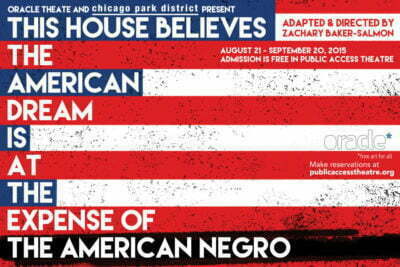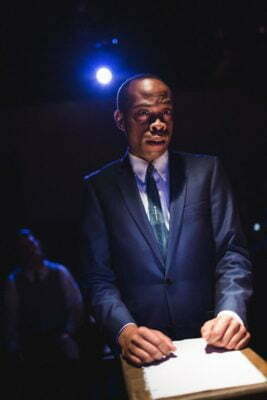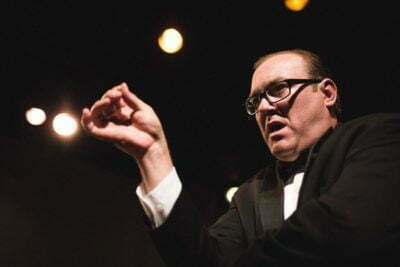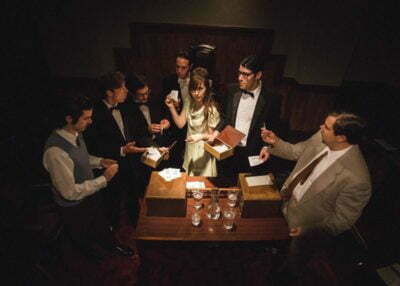This House Believes the American Dream is at the Expense of the American Negro
Adapted and Directed by Zachary Baker-Salmon
Produced by Oracle Theatre, Chicago,
In association with Theater on the Lake
Teaching History to the Choir
From Oracle, the theatre company that recently brought us The Jungle among other highly enjoyable examples of Epic Theatre, comes this latest documentary drama using found text. This House Believes… is a re-enactment of a debate at Cambridge University in 1965 between essayist and civil rights activist James Baldwin and founder of Movement Conservatism William F. Buckley on the subject “Is the American Dream at the expense of the American Negro?” Adapter Zachary Baker-Salmon’s use of the yes side’s resolution as the title clearly establishes the answer to that question, not that there was any chance of it being controversial among Oracle’s audience. The performance—I’m not sure whether to call it a play—was previously performed with Theater on the Lake on the south and west sides, and I imagine was crafted with those other audiences in mind.

Eleanor Kahn’s production design places the audience on confronting sides, with a moderator (Adrian Garcia) presiding from the middle on a throne. One side of the audience sits with Baldwin, played by Johnard Washington and his student supporters, while the other sits with Buckley (Jeremy Clark), and his allies. As in the NET film of the real event, which is currently available on YouTube, an announcer (Ben Harpe), introduces the debate as the most anticipated event in the Cambridge Union Society’s history, and Baker-Salmon’s script it so accurate, he even included the announcer’s “humph” after calling Buckley one of the chief backers of Barry Goldwater. The actors playing undergraduates are scattered amid the audience, and most of Baker-Salmon’s original material consists of their vehement reactions and mutterings regarding the proceedings, which adds about ten minutes to the text from the hour long film.
Washington’s performance is a very close impression of the real Baldwin, whose argument drew from personal experiences, but also used the word “I” to mean all black Americans. This sort of rhetorical exercise apparently precluded the debaters from referencing any documents, and the vagueness of the question required them to speak in generalities about white people believing so-and-so and black people experiencing such-and-such. As in the film, Baldwin’s soft, but firm and cerebral disposition on how black Americans have contributed to the country without getting their fair share in return mesmerizes the audience (both Oracle members and the patrons), and contains a basic, but effective description of the colonial mind-set (post-colonial studies hadn’t developed that much in 1965, only five years after a large number of African countries became independent). In contrast, it is striking how much Clark had to tone Buckley down for the confined space of Oracle’s blackbox. In the film, Buckley contorts his hands into claws while making melodramatic gestures, maintains a constant sneer, and speaks in a controlled, disdainful manner as though he was consciously playing the bad guy. In Oracle’s production, Clark mostly contents himself with imposing on Baldwin’s personal space and yelling back at the students who frequently interrupt him.

The central term “American Dream” is never defined, and the nay side is emphatic that they do not oppose the civil rights movement, only the suggestion that America’s prosperity and system of government is inherently exploitative of black people, rather than exploitative only as practiced at present. But Buckley didn’t even really argue against the resolution; his speech basically just claims that if we acknowledge its truth, then the entirety of Western culture and Christianity is hopelessly corrupt and must be discarded, and he doesn’t want to do that. The existing system contains within it the tools necessary for reform, and revolution is unnecessary. Baldwin didn’t actually propose any kind of mass book burning or claim the American Dream is inherently exploitative—that was Buckley’s way of taking Baldwin’s argument to its extreme logical conclusion—but since “American Dream” is so undefined, it’s impossible to say whether he’s off-subject or not.
 However, this impasse raises the question of what the point of this performance is. The audience is asked to vote on whether we agree with the resolution before and after the show. On the night I went, the tally was 29-3 in favor at the beginning, and 30-2 at the end. Lest you were unclear about what is expected of you, when the announcer says Baldwin receives a standing ovation, you are encouraged to stand up and join in. Not that I was opposed to doing so, but since everything about the show so clearly presumes the audience is already on Baldwin’s side, I don’t see how we’re supposed to be learning anything, unless this project’s backers just wanted to share Baldwin’s wisdom and thought a play would draw more attention than spamming links to the video. If so, they’re not wrong, although the film is worth watching just to see Baldwin’s face when Buckley accuses him of affecting a British accent. Oracle’s production was inspired by the Black Lives Matter movement and is occurring just as St Louis County is undergoing reforms to its municipal courts. One judge and Ferguson city council member said recently that villages had a choice between using laws as a pretext for excessively ticketing and compelling community service from their underclass, and not being able to fund basic utilities. So if the “American Dream” means living in a suburb, then that present, but not hopefully not intrinsic, exploitation has lasted a very long time. But Oracle only presents a fine re-enactment, we’re left to draw the real life connections ourselves.
However, this impasse raises the question of what the point of this performance is. The audience is asked to vote on whether we agree with the resolution before and after the show. On the night I went, the tally was 29-3 in favor at the beginning, and 30-2 at the end. Lest you were unclear about what is expected of you, when the announcer says Baldwin receives a standing ovation, you are encouraged to stand up and join in. Not that I was opposed to doing so, but since everything about the show so clearly presumes the audience is already on Baldwin’s side, I don’t see how we’re supposed to be learning anything, unless this project’s backers just wanted to share Baldwin’s wisdom and thought a play would draw more attention than spamming links to the video. If so, they’re not wrong, although the film is worth watching just to see Baldwin’s face when Buckley accuses him of affecting a British accent. Oracle’s production was inspired by the Black Lives Matter movement and is occurring just as St Louis County is undergoing reforms to its municipal courts. One judge and Ferguson city council member said recently that villages had a choice between using laws as a pretext for excessively ticketing and compelling community service from their underclass, and not being able to fund basic utilities. So if the “American Dream” means living in a suburb, then that present, but not hopefully not intrinsic, exploitation has lasted a very long time. But Oracle only presents a fine re-enactment, we’re left to draw the real life connections ourselves.
Recommended
Jacob Davis
[email protected]
Reviewed August 21, 2015
This show has been Jeff Recommended.
For more information, see This House Believes’ page on Theatre in Chicago.
Playing at Oracle Theatre, 3809 N Broadway, Chicago. Admission is free; to reserve seats, visit publicaccesstheatre.org. Performances are Monday, Friday, and Saturday nights at 8:00 pm, and Sundays at 7:00 pm through September 19. Running time is seventy minutes.
